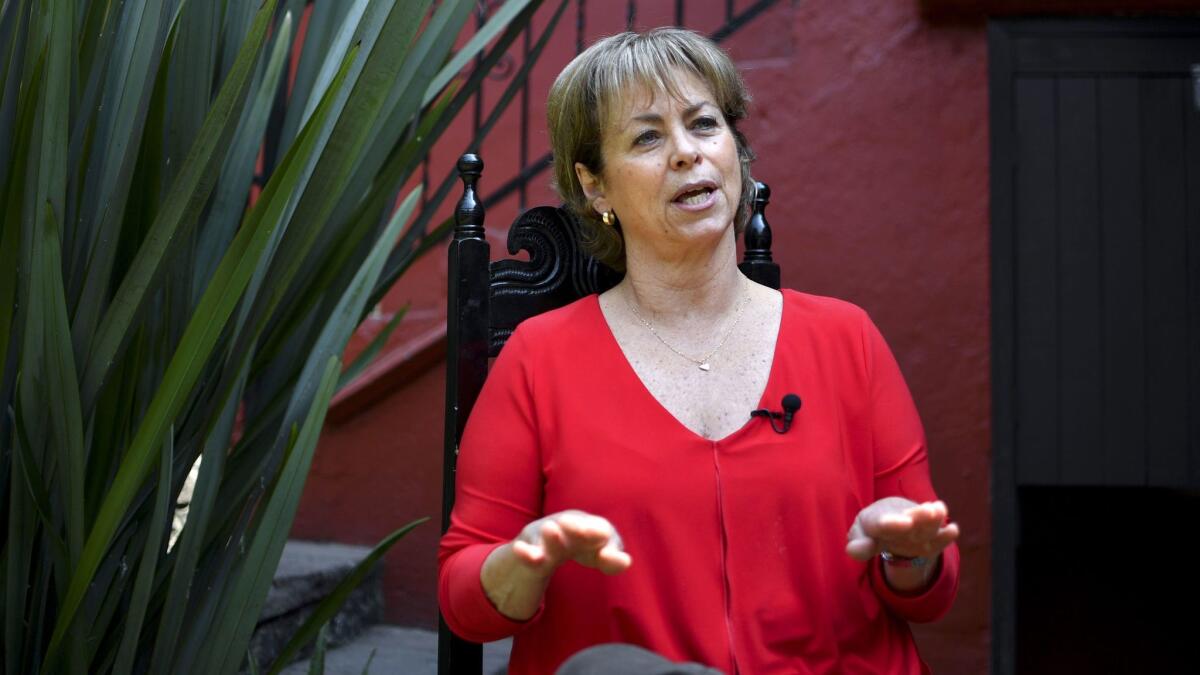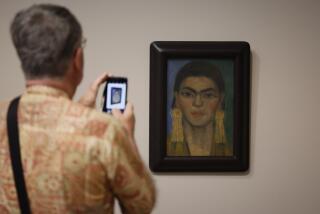Mattel has a new doll: Frida Kahlo Barbie. Descendants of the artist want it off the shelves
- Share via
Reporting from Mexico City — As the world honored women this week, a fierce battle has emerged here about rights to the image of one of the 20th century’s most celebrated: Frida Kahlo, the Mexican artist who died in 1954 but has now made a reappearance — as a Barbie.
The dispute pits Kahlo’s descendants in Mexico against the toy giant Mattel, which rolled out the Frida Kahlo Barbie doll just in time for International Women’s Day.
Mattel says it has the legal rights to use the Kahlo image, while family members here deny that.
The dispute has raged on social media and in the press in Mexico.
The Kahlo doll features the familiar floral crown, braided black hair, flowing print dress, fringe shawl and de rigueur earrings and necklace. Lacking, however, are Kahlo’s signature uni-brow, her much commented-upon upper lip hair and the baubles that adorned most of her fingers. Mattel also made her look slimmer.
The company is touting the Kahlo doll as part of a new Barbie line, the latest in the company’s efforts to diversify its Barbie brand, which debuted in 1959.
Kahlo’s history of transcending victimhood resonates deeply today, as do her leftist politics, bohemian lifestyle and singular look and style.
Her enigmatic visage stares out from T-shirts and jewelry, coffee cups, ash-trays, posters, tequila bottles — and now has a Barbie iteration. The doll went on sale this week on Mattel’s website for $29.99, but quickly sold out and will soon be replenished, a spokeswoman for the company said.
“The Barbie Inspiring Women Frida Kahlo doll celebrates the groundbreaking achievements, heroism and long-lasting contributions Frida made in the art world and for women,” Mattel’s website states. “Her extraordinary life and art continue to influence and inspire others to follow their dreams and paint their own realities.”
The other two initial dolls in the “Inspiring Women” series represent Amelia Earhart, the pioneer aviator, and Katherine Johnson, the African American mathematician.
While commentators are deeply divided on the look of Mattel’s Kahlo, the controversy doesn’t focus on the doll’s aesthetics. The question is whether Mattel was entitled to use Kahlo’s image in the first place.
Mattel, based in El Segundo, said in a statement that it has a “legally binding agreement” with the owner of the rights to Kahlo’s name and identity “to make a doll in the likeness of the great Frida Kahlo.”
Mattel said that it has worked “in close partnership with the Frida Kahlo Corporation, the owner of all rights related to the name and identity of Frida Kahlo,” and that the corporation was “an important part of the doll development process.”
But one of the artist’s descendants, Mara Romeo, Kahlo’s grand-niece, has launched a very public campaign alleging that Mattel proceeded without lawful permission. Romeo says she and her family retain the rights to Kahlo’s image, and she is threatening to sue to block distribution of the doll.
“The company Mattel does not have the proper authorization to use the image of Frida Kahlo,” Romeo wrote in a Twitter message that was trending this week on Mexican social media.

Mattel, she wrote, may have been a victim of “deception” or “ignorance,” assertions that the toy company denies.
The Frida Kahlo Corp., based in Panama, was launched in 2005.
Its website features Kahlo-themed products past and present, including beer, cosmetics, mouse pads, keychains, an “official Frida Kahlo Trivia game” and a prepaid Visa card. “Bank with Frida,” the site advises.
The corporation says it acquired the rights to all things Kahlo from the artist’s late aunt, Isolda Pinedo Kahlo, the mother of Romeo and a pioneer in marketing the Kahlo label.
Before her death in 2007, Pinedo Kahlo championed a Frida Kahlo tequila line that sparked a raging controversy in Mexico about what some viewed as the crass peddling of an artist known for her leftist politics and intimate friendship with Leon Trotsky, the Russian Bolshevik revolutionary assassinated in 1940 in Mexico City.
The debate over the marketing of Kahlo, who died at age 47, has only become fiercer as her renown has spread and her face has become one of the world’s most recognized.
“Frida was a militant of the Communist Party,” the author David Martin del Campo said last year while presenting a new book about the artist. “She would never have wanted to have been an element of commercialization on bags, T-shirts or socks.”
The Frida Kahlo Corp. rejects the complaint from Kahlo’s family.
“There is no argument here,” said Beatriz Alvarado, a spokeswoman for the corporation, speaking from Florida. “We have all the rights registered.”
In fact, Alvarado added, Romeo — the grand-niece who is challenging the corporation’s licensing deal with Mattel — remains a shareholder in the privately held Frida Kahlo Corp., and one of three members of its board of directors.
“I believe she is not very well guided by the people she hired to give her some advice,” Alvarado said.
Mattel is seeking to stay above the fray.
“It’s very odd that she [Kahlo’s grand-niece] seems not to be aligned with a company that she’s a shareholder in and a board member of,” said Michelle Chidoni, a Mattel spokeswoman. “We want to make sure that the intent of this line doesn’t get lost in what seems like a fight between two parties that aren’t Mattel. … The Frida Kahlo story is an inspiring one that we believe can inspire more girls.”
The company is pushing ahead with its plan to ship the dolls to retail stores to go on sale March 26, she said.
Neither Mattel nor the Frida Kahlo Corp. would comment on the financial details of the licensing deal.
Kahlo’s descendants in Mexico were never consulted in connection with the doll project and heard about it on social media, said Pablo Sangri, an attorney for the family.
He said Kahlo’s grand-niece broke her formal relationship with the Frida Kahlo Corp. in 2010 amid financial losses and disagreements. Moreover, he asserted that the corporation only had the rights to Kahlo’s name, not her image.
“Certainly not a doll,” Sangri said, insisting that the family was acting out of principle, not seeking cash in its public spat with Mattel.
“For the family this is not a matter of money; it’s for the love of everything Frida Kahlo represents,” said the lawyer, though he noted that the family wasn’t pleased about the doll’s appearance either.
“It looks very stylized, very much in the Barbie style,” Sangri said. “And we are going to fight to be sure that it doesn’t go on sale.”
Kahlo, whose career was overshadowed by that of her larger-than-life husband, Diego Rivera, the Mexican muralist, has evolved into a 21st century icon, her turbulent life featured in film, books, exhibitions and lectures — while her idiosyncratic works, many anguished self-portraits, fetch millions and are scooped up by the likes of Madonna.
Her well-documented travails — Kahlo suffered from polio and the effects of a disastrous streetcar accident, while enduring a notoriously philandering husband — have only added to her contemporary appeal, as has her reported bisexuality.
Like Ernesto “Che” Guevara, another communist and unabashed admirer of Soviet Russia, Kahlo has become an attractive brand for a new, post-Cold War age.
And that’s the rub, as various parties seek to stake claims for their piece of a lucrative, global phenomenon that some have labeled Fridamania.
Cecilia Sanchez in The Times’ Mexico City bureau contributed to this report.
To read this article in Spanish click here
Twitter: @PmcdonnellLAT
More to Read
Sign up for Essential California
The most important California stories and recommendations in your inbox every morning.
You may occasionally receive promotional content from the Los Angeles Times.










